#PESCOGATE Remember the campaign I organised in 2017? #Military #UK #EU #PermanentStructuredCoOperation #SandhurstTreaty #TheyWorkForYou 🙃 #Epetitions
- Caroline Stephens

- Aug 7, 2025
- 7 min read
No?
Here was the flyer


Way back in 2017, two of us prepared a template letter to be issued to MPs.
A TEMPLATE



MPs responses began to arrive back with many being similarly worded to the following examples:


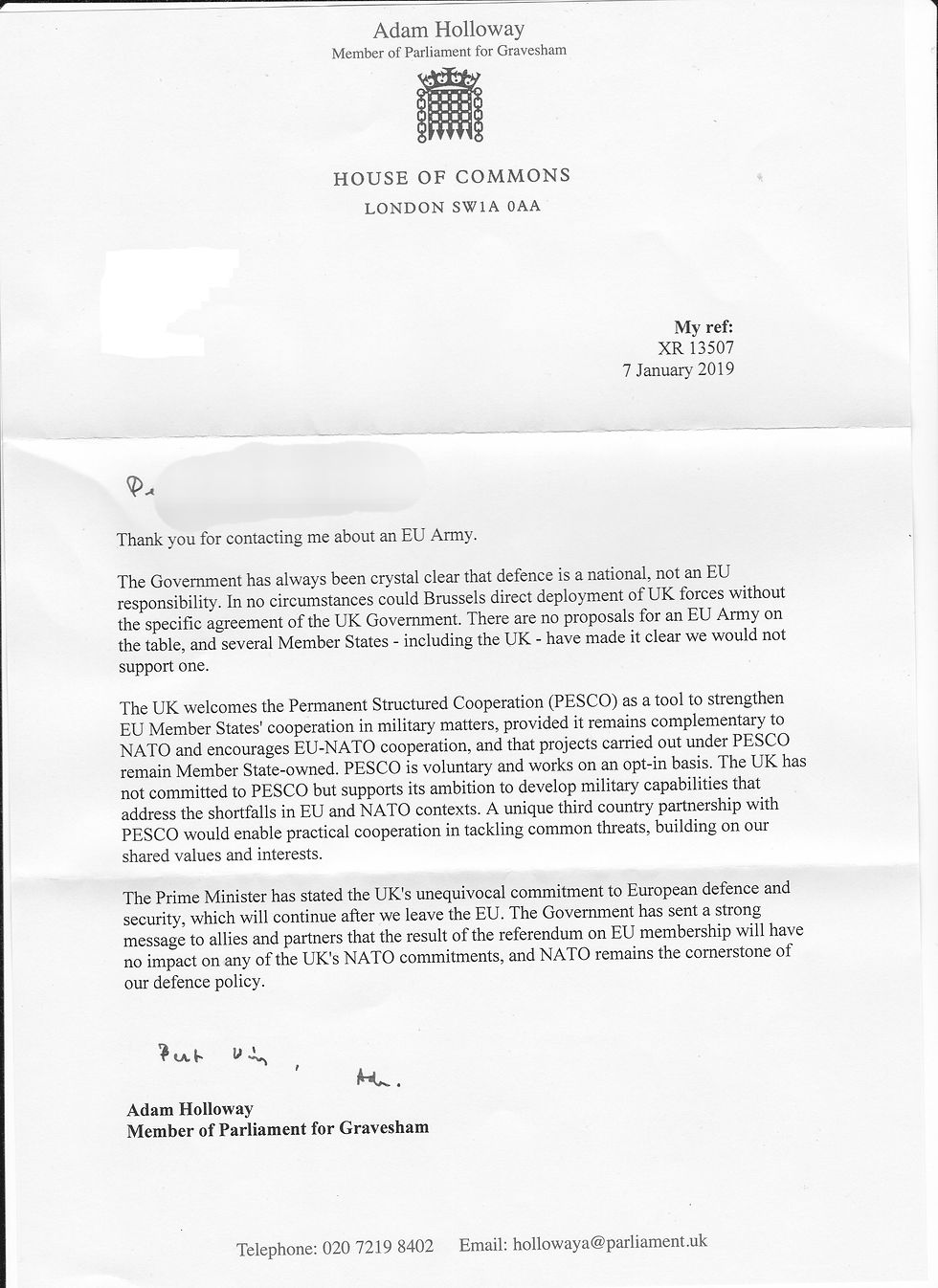


Did your MP respond to your letter or email?🙄🙄
Timeline beginning 26th October 2017:
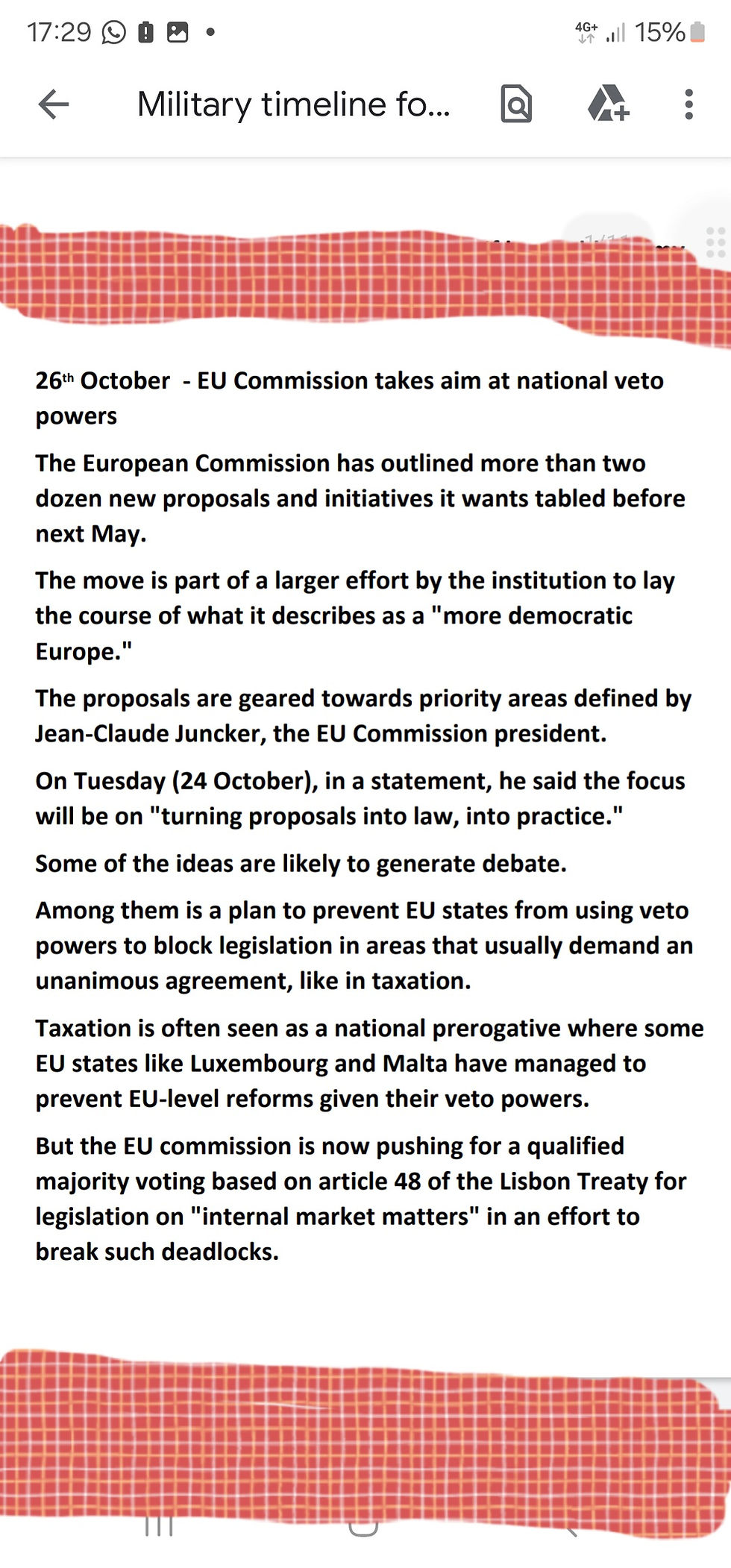
Here is the proof dated 25th October 2017 regarding the EU taking aim at national veto powers.
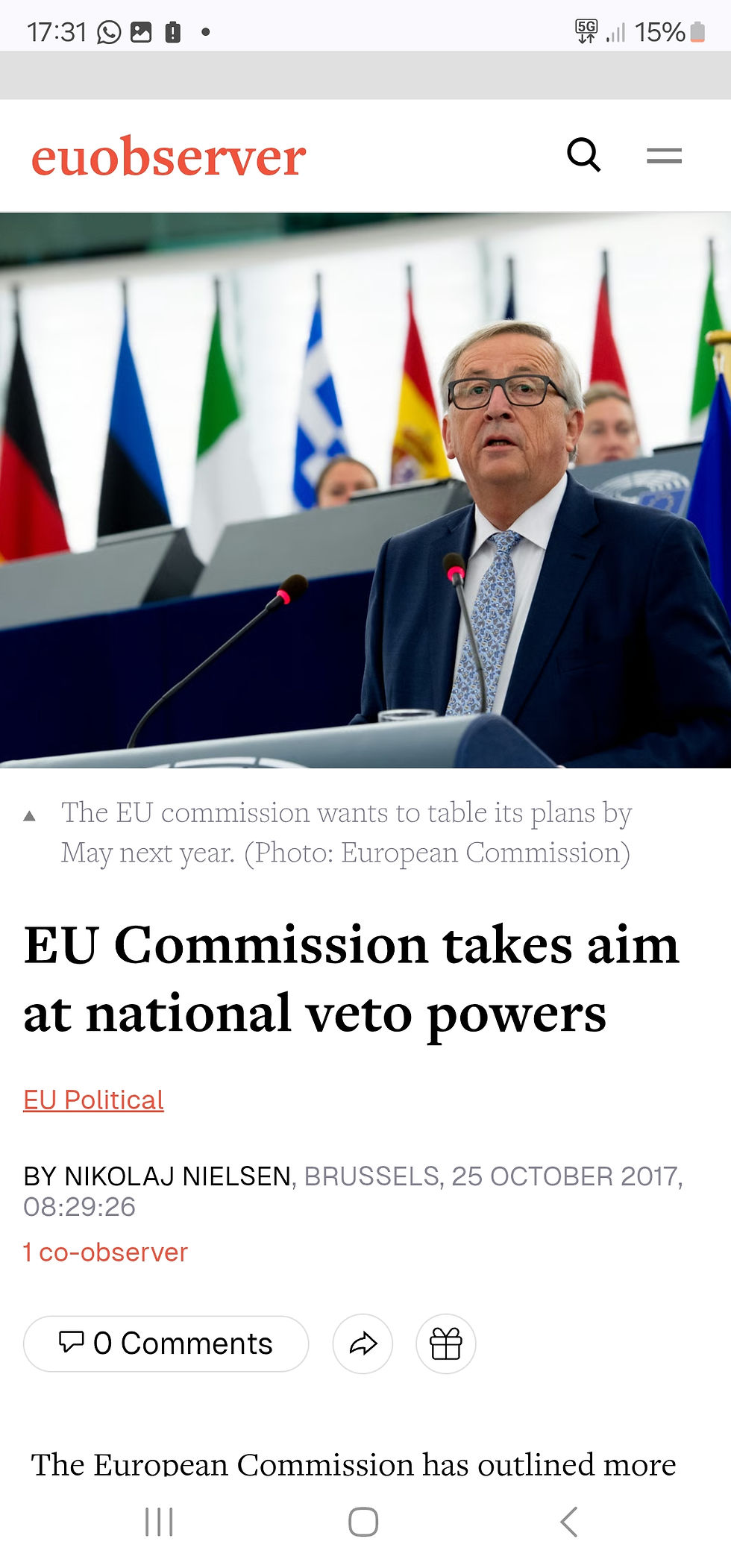

EPETITION

TIMELINE CONTINUED
🇫🇷 🇫🇷 🇫🇷 🇫🇷 🇫🇷 🇫🇷 🇫🇷 🇫🇷 🇫🇷 🇫🇷 🇫🇷 🇫🇷
18th January 2018
'Sandhurst Treaty': Britain and France agree new deal on border security
Prime Minister Theresa May and French President Emmanuel Macron agreed a new border security deal on Thursday, through which the UK will pay more to France to stop migrants trying to reach British shores.
May also confirmed the loan of the Bayeux Tapestry from France, a historic work depicting the Norman conquest of
England which she said would come to Britain in 2022 for the first time in over 900 years.
The two leaders meeting for wide-ranging talks at the Sandhurst military academy near London, agreed that the
UK will pay an extra £44.5 million (50 million euros, $62 million) for fencing, CCTV and detection technology in Calais
and other Channel ports.
"The further investment we have agreed today will make the UK's borders even more secure," May said during a joint
press conference with Macron.
The 35th UK-France summit came as Britain tries to strengthen bilateral ties before leaving the European Union
in March 2019.
May said she was "honoured" by the loan of the Bayeux Tapestry and Macron said he hoped it would open "a new
chapter" for cultural and scientific co-operation.
"We are somehow making a new tapestry together," Macron said, rejecting any suggestion that it was intended to remind Britain of a victorious France.
The loan has been met with opposition by French experts who have warned about the delicate state of the 70-metre
(230-foot) long embroidery. the tapestry, which shows how the English King Harold being killed by an arrow in the eye at the Battle of Hastings
in 1066, is believed to have been created within years of the
battle.
Financial services warning
The UK-France summit came as Britain tries to strengthen bilateral ties before leaving the European Union in March 2019.
The French flag was raised over the military base and the French national anthem played out for the arrival of May
and Macron, who were greeted by a guard honour and a flypast of two planes.
They earlier visited the Michelin-star Royal Oak pub in May's Maidenhead constituency, where they had a
"convivial" lunch together according to a British source.
While Brexit was not scheduled for formal discussion, Macron said Britain's decision to leave the European Union
would lead to some "short-term uncertainties". Macron also said that Britain could have "no differentiated
access to financial services" if it decides to leave the European single market.
Otherwise, Britain would have to pay into the EU budget.
"There shall be no hypocrisy in this respect... otherwise we would destroy the single market," he said.
The French president stressed that the new border agreement was a bilateral accord, separate from any EU
divorce deal, aimed at managing the sensitive of immigration as hundreds of people continue to camp out in
Calais.
4
Helicopters to Africa
The British prime minister also committed to sending Royal
Air Force (RAF) helicopters to a key French counter- terrorism operation in Mali.
Mali is a vast, landlocked country in West Africa with a semi-arid climate. It is a low income country with an
undiversified economy that is vulnerable to raw material price fluctuations. 74.9 % of its exports are pearls, precious
stones, metals, coins. It shares a boundary with Algeria.
The deployment of three RAF Chinook helicopters to provide logistic support to French troops tackling jihadis
across Africa's Sahel region is part of broader counter-terrorism and military efforts there by the UN, the EU and
the African Union.
It is seen as particularly significant as France is lacking in such capabilities and Britain's commitment could mark the
start of a longer-term deployment in the region.
"Since the last UK-France summit we have seen appalling
and cowardly terrorist attacks in both our countries, in
which British and French citizens have died side-by-side,"
May said.
France in turn has agreed to commit troops to the British-led NATO battlegroup in Estonia in 2019.
🇫🇷 🇫🇷 🇫🇷 🇫🇷 🇫🇷 🇫🇷 🇫🇷 🇫🇷 🇫🇷 🇫🇷 🇫🇷 🇫🇷

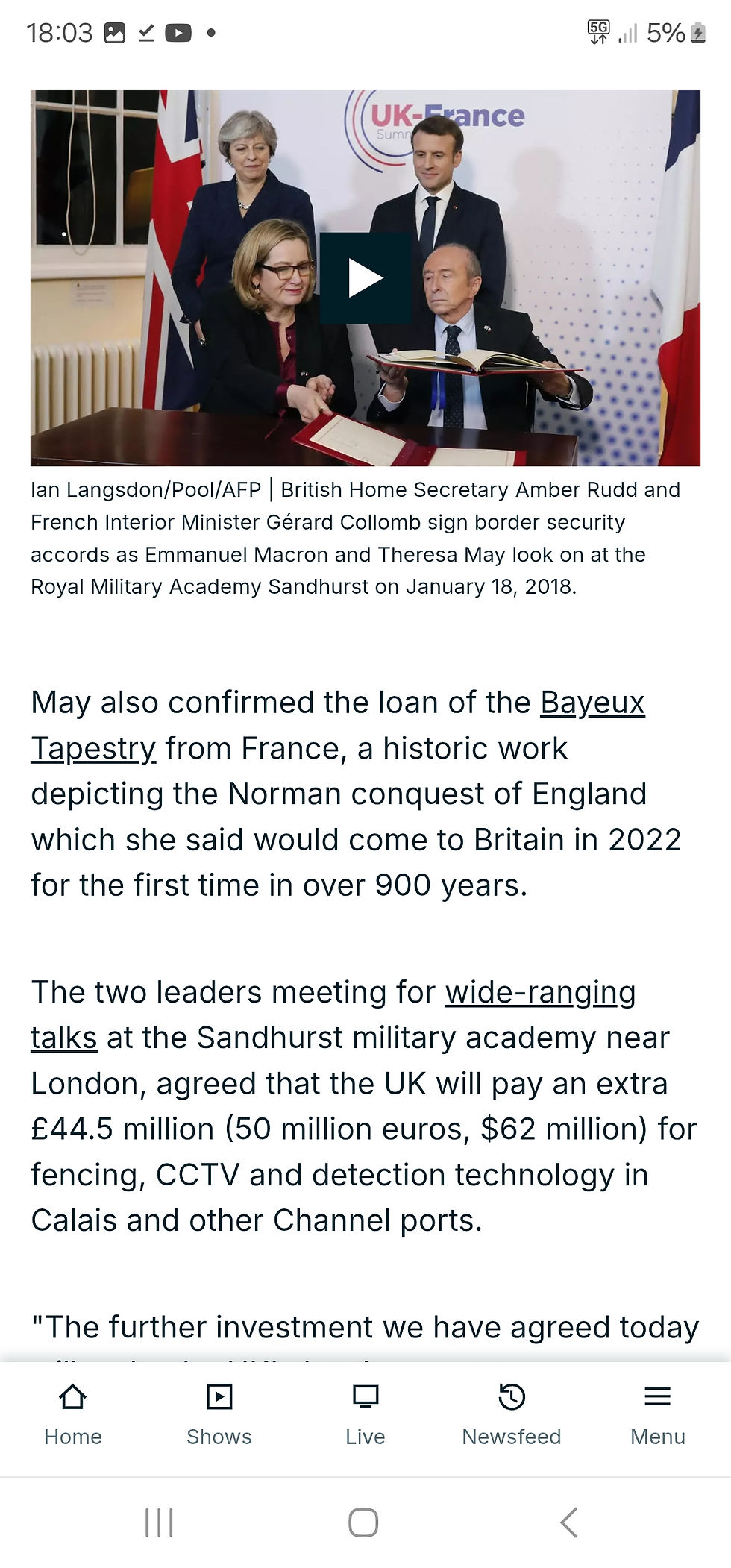
'Sandhurst Treaty': Britain and France agree new deal on border security https://www.france24.com/en/20180118-france-uk-migrants-calais-sandhurst-treaty-britain-france-agree-new-deal-border-security
💩💩💩💩💩💩💩💩💩💩💩💩💩💩
On 6th December 2018, the following comments were made in UK Parliament:
Written Answers - Ministry of Defence: EU Defence Policy (6 Dec 2018)
Mark Lancaster: The UK has not joined Permanent Structured Cooperation
(PESCO), but recognises its potential to support increased defence
investment in Europe and the development of capabilities that contribute
to NATO. The Government is scrutinising the current list of PESCO
projects to identify which of those we might have an interest in, or be
able to add value to, as a third country. Our future...



TIMELINE CONTINUED
🇫🇷 🇪🇸 🇵🇹 🇩🇪 🇫🇷 🇪🇸 🇵🇹 🇩🇪
20th September 2019
Brexit raises questions for EU defence integration
Ahead of a new institutional cycle beginning in November, the European Commission and the EU-27 are reflecting upon the future global role of the EU, particularly its ability to act independently in the world.
Brexit has raised many questions about the EU's approach towards security and defence, especially its perception of
the role that the UK, a major military actor on the continent, would play after it leaves the EU.
At the moment Brussels expects to engage with London on the same basis as with other third countries.
However, given its capabilities in this area, it is not unreasonable for the UK to expect a role proportional to its
security contributions, and without these contributions the EU's plans for 'strategic autonomy' are unlikely to be
credible.
Since the 2016 referendum (and perhaps as a consequence
of the result), the EU has shown interest in greater
integration in this area, which the UK often blocked with its
veto.
In 2017, the Permanent Structured Cooperation (PESCO) was launched, with the goal to develop joint military
capabilities and operational capacity.
The European Defence Fund (EDF), proposed by the Commission to help member states coordinate their
defence spending, is due to be granted approximately €13bn from the next long-term budget (Multi-Annual
Financial Framework, MFF).
While it is an exaggeration to speak of an 'European army', in recent years there has been an increased movement
towards further integration on defence.
Incoming Commission president Ursula von der Leyen has made "an integrated and comprehensive approach to
[European] security" a priority of her programme, while suggesting strengthening institutions such as the European Defence Fund (EDF) and using qualified majority voting (QMV) in foreign policy.
Space frontier
The new Commission will also include a new directorate - general for defence industry and space, responsible for an "open and competitive European defence equipment market" and implementing space programmes.French president Emmanuel Macron, who recently
displayed his ambitions to be Europe's leading diplomat, has also been calling for a stronger role for the EU on the
international stage.
In his call for European renewal, he argued for a treaty on defence and security, increased spending and setting up a new institution, the European Security Council, for more effective decision-making.
Macron has stated multiple times that reinforcing European defence integration was a priority for his government, while also reiterating his commitment to cooperation with the trans-Atlantic alliance.
After the G7 in August, Macron hosted ambassadors based in France and made a speech about the importance of
building 'European sovereignty' in the wake of global changes, warning that Europe could become a minor
actor in world dominated by the US and China.
Part of building this European autonomy, according to Macron, is to be "sovereign in the sphere of defence," and
he pointed out that this cannot be built without the UK's participation.
Minus the UK
But neither the commission nor the 27 capitals have set out in detail their vision for future coordination and cooperation with the UK after it is no longer part of EU institutions.
The UK is one of the two major military players on the European continent, and as Macron recognised, without its
involvement, European defence initiatives are unlikely to be credible enough to match the ambition of developing a
more autonomous defence policy.
The European Court of Auditors pointed out that the EU's planned increase in defence spending would not
compensate for the gap created by the UK's withdrawal, and there would be a "mismatch" between resources and
ambitions of European 'strategic autonomy'.
Although British contributions to the EU's Common Security and Defence Policy (CSDP) missions have not been
significant, after Brexit the UK's strategic interests on the European continent will not change radically, and both
Theresa MAY and BORIS Johnson have stated their intentions to remain COMITTED to European security.
For future arrangements, much will depend on the political ambitions and level of trust between both sides, whatever the outcome of Brexit.
Even in a no-deal scenario, the UK could be willing to contribute and participate in operations that are in its strategic interests, notably those in the EU's neighbourhood.
The EU seems keen to welcome the contribution of UK assets for its objectives, but at the same time it is not prepare to go further than current arrangements with third parties for defence cooperation.
It is not clear yet how countries outside the EU could engage with PESCO, for instance, but they are unlikely to
get any influential role.
Brussels' current vision for cooperation on defence, where third countries can contribute but have no say in decision-
making and in the guidance of operations, is unlikely to be
attractive to the UK.
Most of the defence sphere is not about the EU framework
– the Commission itself admits that NATO will remain the cornerstone of European security, and the alliance with the US will likely remain the UK's preferred choice.
Cooperation could also continue via bilateral agreements, notably the defence treaty with France, as well as the new European Intervention Initiative (EII) set up by Macron, of which the UK is already a member.
Overall, both sides have a number of questions to answer about their future security and defence relations.
The UK will have to develop a policy towards the EU's integration initiatives (whatever path these take), and to
set out its preferred formats for future dialogue.
Meanwhile, the EU appears to have given little thought about how to cooperate with the UK on a joint basis, rather
than sticking to its previous formats of cooperation.
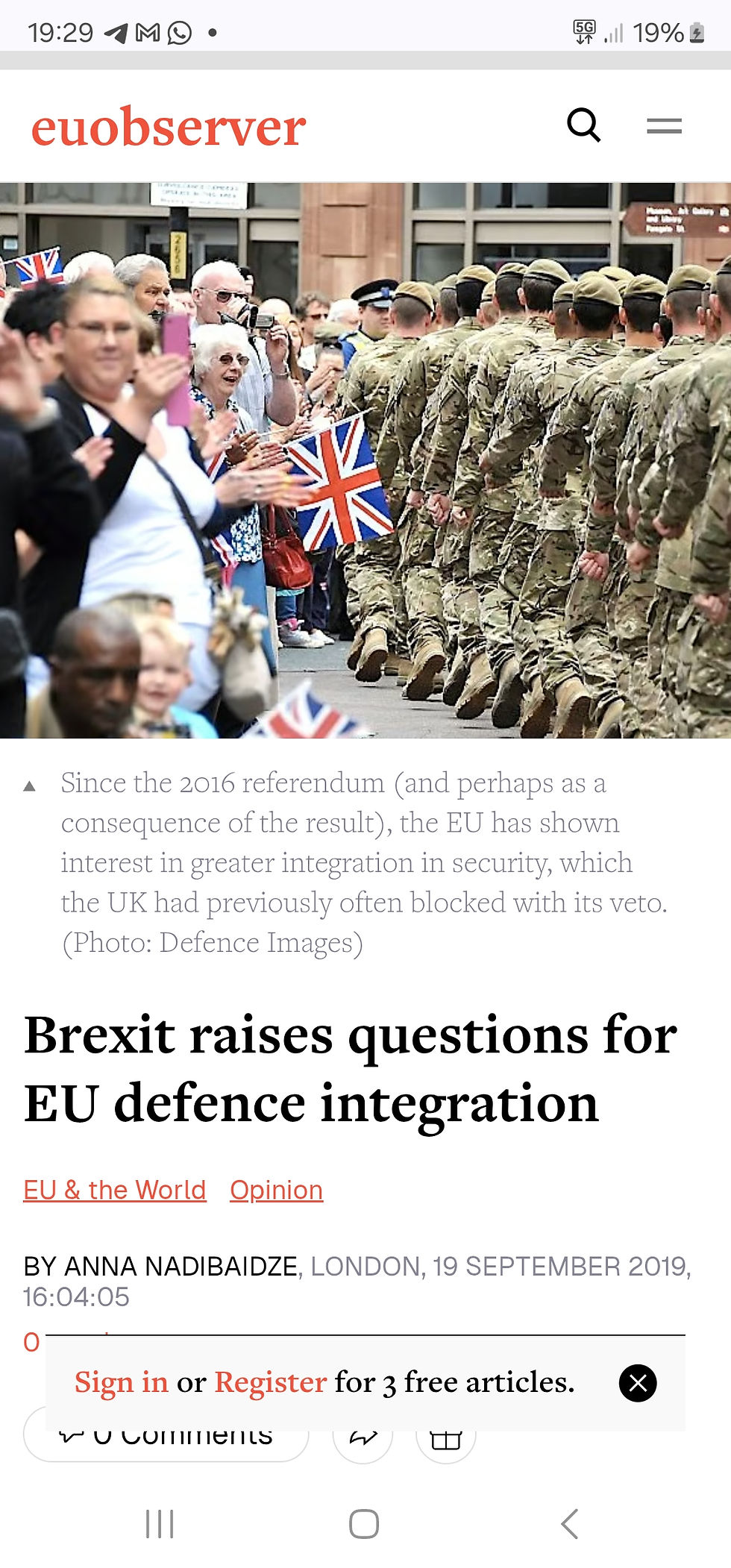
😏😏😏😏😏😏😏😏😏😏😏😏😏😏😏
🦄🦄🦄🦄🦄🦄🦄🦄🦄🦄🦄🦄🦄🦄🦄
But what is the real truth in 2025?
Please keep revisiting this page. It is a Work in Progress. 💯
It does appear that the Military Complex and 'Migration Watch' seem to be inextricably linked.

EPETITION
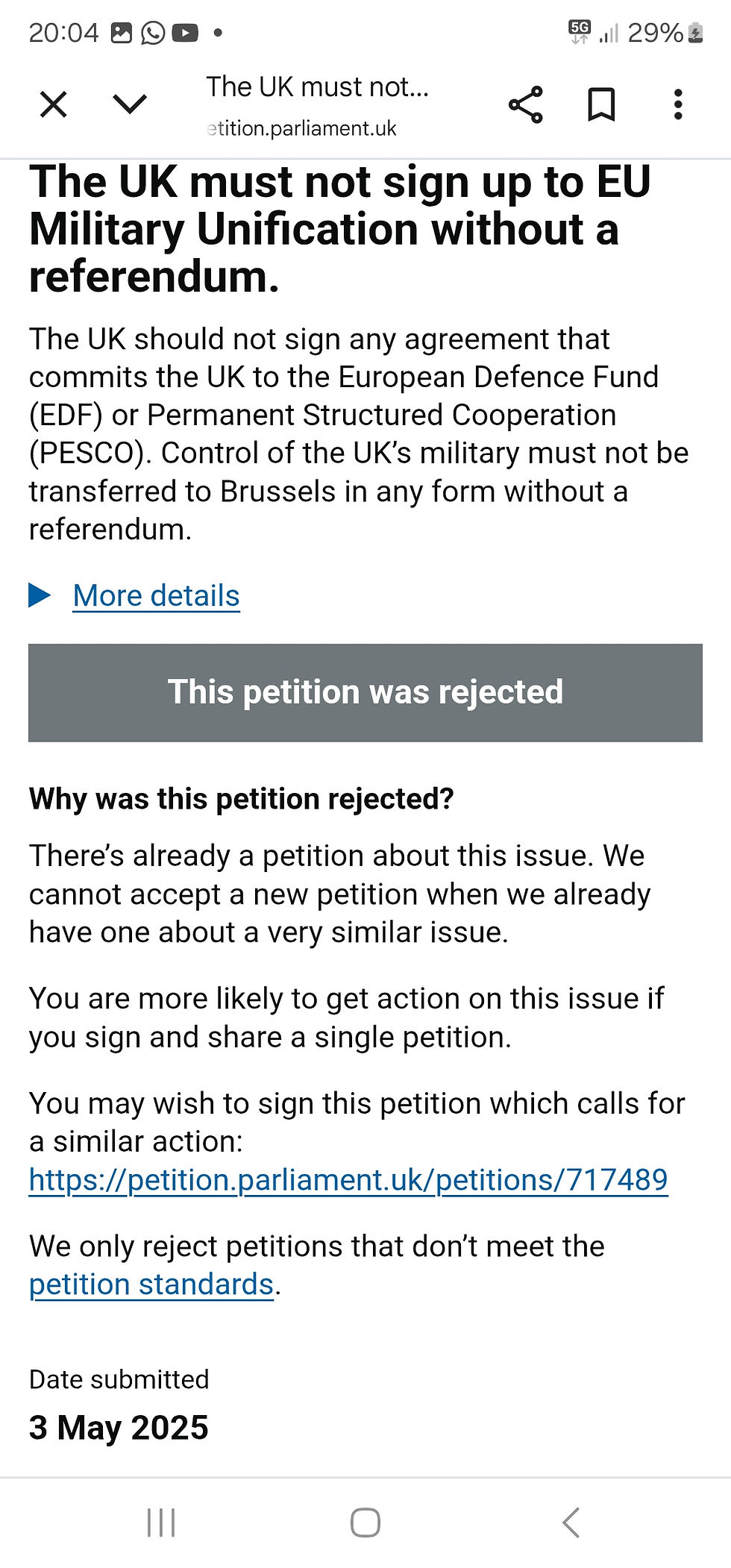
Please also ensure that everyone is informed. The future, your future....
The Future of England and Great Britain



Comments